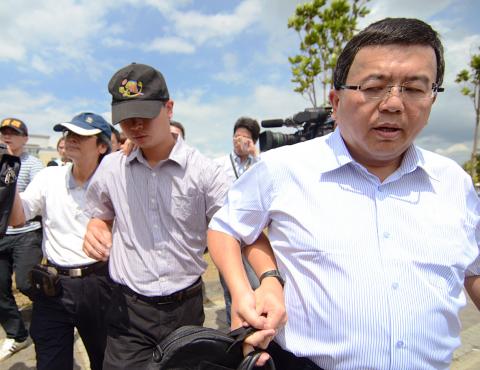|
Key personnel questioned on Hung
By Rich Chang and Chris Wang / Staff reporters

Military doctor Lu Meng-ying,
center, appears at the Military High Court in Taipei yesterday to clarify his
role in the death of soldier Hung Chung-chiu.
Photo: CNA
Army Commander General Lee Hsiang-chou
(李翔宙) last night bowed and apologized to the public and the family of late army
corporal Hung Chung-chiu (洪仲丘), pledging to get to the bottom of the closely
watched case and bring all responsible parties to justice.
“The army is definitely not a criminal organization and does not tolerate any
criminal-like behavior … The army commander’s investigation task force will
conduct a thorough probe into Hung’s case based on the principles of zero
tolerance for violations of the laws and regulations,” Lee said at a press
conference that was held at the Ministry of National Defense.
Lee said he had promised Hung’s family to “put himself in their position and
adopt a responsible attitude” in handling the unfortunate incident, adding that
he humbly accepted the opinions, criticism and advice voiced by members from all
sectors of society over the case.
Military prosecutors yesterday summoned key military personnel for questioning
in the case surrounding the July 4 death of the 23-year-old army corporal.
First Sergeant of the army’s 542nd Brigade Chen Yi-jen (陳以人), Staff Sergeant Fan
Tso-hsien (范佐憲), Major Hsu Shin-cheng (徐信正), discharged military doctor Lu
Meng-ying (呂孟穎) and discharged soldier Liu Hsuan-yang (劉烜揚) were questioned in
the Military High Court’s Prosecutors’ Office over the circumstances leading to
Hung’s death.
The vice commander of the army’s 542nd Brigade, Colonel Ho Chiang-chung (何江忠),
was detained on Tuesday over his suspected role in Hung’s case. Ho is the first
senior military official to be detained in the investigation.
Before entering the Military High Court’s Prosecutors’ Office, Liu, who was
Hung’s friend, told reporters that Fan should have been detained.
“I will tell military prosecutors what I have said in the media,” he added.
Liu gave several interviews earlier this week and alleged that Chen and Fan were
the two key people involved in Hung’s death.
Liu said that Hung was responsible for having vehicles of 542nd Brigade repaired
outside the base. Liu said Chen and Fan resented Hung’s life being “too good”
and asked the vice commander of the brigade, Colonel Ho Chiang-chung, to have
Hung confined.
Hung was serving in the army’s 542nd Brigade in Hsinchu County and was due to be
discharged on July 6. He was transferred to the 269th Brigade in Taoyuan on June
28 for disciplinary reasons after he brought a smartphone with a camera onto the
base.
On July 3, Hung suffered heat exhaustion during a training session — he was
still in confinement earlier that day — and was sent to a military hospital in
Taipei.
Hung died at the hospital of multiple organ failure after efforts to resuscitate
him failed.
Meanwhile, the Democratic Progressive Party (DPP) said it was “concerned and
angry” about Hung’s death and has established two panels at DPP headquarters and
its legislative caucus to monitor human rights cases in the military.
“The DPP demands the government seek the truth behind Hung’s death, hold those
responsible accountable and reform the military,” DPP Chairman Su Tseng-chang
(蘇貞昌) said after the party’s weekly Central Standing Committee meeting.
The committee reached a resolution to establish a seven-member military human
rights reform panel, which would be convened by former premier Yu Shyi-kun (游錫堃)
and include DPP Deputy Secretary-General Lee Chun-yi (李俊毅), and legislators Gao
Jyh-peng (高志鵬), Hsiao Bi-khim (蕭美琴), Wu Ping-jui (吳秉叡), Chen Ting-fei (陳亭妃) and
Tsai Chi-chang (蔡其昌), Su said.
“Discipline should never be a reason for committing a crime,” he said, adding
that the panel would work on amending legislation to further protect human
rights in the military.
The chairman also said the DPP supported a protest planned for Saturday in front
of the ministry, organized by a rights group called Citizen 1985.
Meanwhile, the DPP caucus announced the establishment of a seven-member panel on
military human rights investigation and legislation, which included Gao Jyh-peng,
Wu Ping-jui, Liu Chao-hao (劉櫂豪), Yu Mei-nu (尤美女), Wu Yi-chen (吳宜臻), Chiu Yi-ying
(邱議瑩) and Lee Ying-yuan (李應元).
Additional reporting by staff writer, with CNA
|
![]()
![]()
![]()